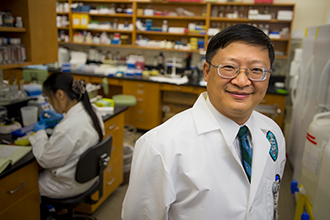$1.5 million grant supports research of inflammation and cancer
Dr. Zongbing You, assistant professor in the Tulane University Department of Structural and Cellular Biology, received a five-year, $1.5 million grant from the National Cancer Institute to study the small protein molecule Interleukin-17 and its role in inflammation and the formation and progression of prostate cancer.

Dr. Zongbing You and his team are exploring Interleukin-17 and its possible connection to inflammation and prostate cancer. (Photo by Paula Burch-Celentano)
Ultimately, they hope their research leads to the development of inhibitors for IL-17 that could be used to block or neutralize its function. “We're hoping to drive our research closer to a clinical trial so that we can potentially develop new drugs that could be used for the treatment or prevention of prostate cancer.”
Such drugs may be useful for other types of cancer displaying over-expression of IL-17 colon, skin and breast or for other inflammatory diseases, such as rheumatoid arthritis or ulcerative colitis.
“Chronic inflammation has been associated with several cancers,” You says. “All biopsied prostate cancer tissue and all surgically removed prostate cancer specimens contain evidence of inflammatory cells in and around the tumor, but the causal relationship between inflammation and prostate cancer has not been well established.”
IL-17 is produced by immune cells to act as a messenger, guiding other cells through the immune system's normal inflammatory process. Researchers have demonstrated that both IL-17 molecules and their receptors are overly expressed in prostate tumors. But does its presence signal an attack on invading prostate cancer cells by the immune system or an association with prostate cancer formation and progression?
In preliminary experiments, You's team removed the gene coding for the IL-17 receptor in a mouse model of prostate cancer, essentially cutting off the signaling pathway from the small molecule to the cell.
“We found that if you cut off the IL-17 pathway, the animals formed smaller and fewer invasive cancers in this model. That's how we determined that IL-17 may be promoting prostate cancer formation.”
Melanie Cross is manager of communications at the Tulane Cancer Center.
